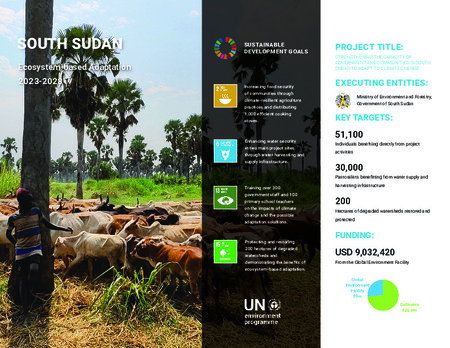| dc.contributor | Climate Change Division | en_US |
| dc.contributor.author | United Nations Environment Programme | en_US |
| dc.coverage.spatial | South Sudan | en_US |
| dc.date.accessioned | 2024-07-26T08:55:55Z | |
| dc.date.available | 2024-07-26T08:55:55Z | |
| dc.date.issued | 2024-07-01 | |
| dc.identifier.uri | https://wedocs.unep.org/20.500.11822/45994 | |
| dc.description | South Sudan in eastern Central Africa,is one of
the world’s most fragile states and one of the
most underdeveloped countries in the world.
Communities in South Sudan are particularly
reliant on natural resources for their livelihoods,
and approximately 86% of rural households rely
on rain-fed agriculture and animal husbandry
as their main source of livelihood.
Despite providing key services to local
communities, including water supply and
fuelwood, vital ecosystems are being degraded
from a combination of population growth and
an over-reliance on natural resources.
A major project is increasing the climate
resilience of vulnerable communities in
two states by focusing on the priority areas
identified within South Sudan’s National
Adaptation Programme of Action - namely
agriculture, disaster risk reduction, water
resources, policy, and institutional frameworks. | en_US |
| dc.description.uri | https://www.unep.org/explore-topics/climate-action/what-we-do/climate-adaptation/ecosystem-based-adaptation | en_US |
| dc.format | pdf | en_US |
| dc.language | English | en_US |
| dc.rights | Public | en_US |
| dc.subject | climate | en_US |
| dc.title | Ecosystem-based Adaptation in South Sudan 2023-2028 | en_US |
| dc.type | Factsheets, Infographics and Brochures | en_US |
| wd.identifier.sdg | SDG 13 - Climate Action | en_US |
| wd.topics | Climate Action | en_US |
| wd.identifier.pagesnumber | 2 | en_US |


